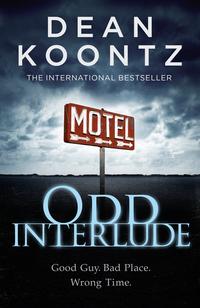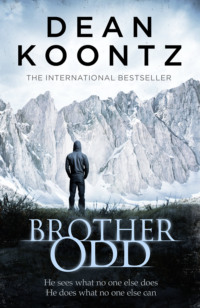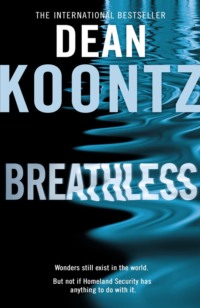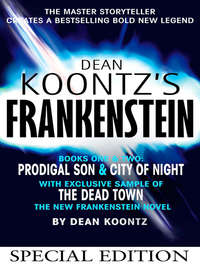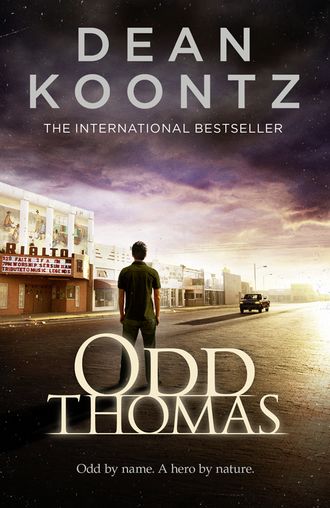
Полная версия
Odd Thomas
“Is this the new flavor came in last week?” I asked.
“Yeah.”
“Cherry chocolate coconut chunk?”
“Coconut cherry chocolate chunk,” she corrected. “You’ve got to get the proper adjective in front of chunk or you’re screwed.”
“I didn’t realize the grammar of the ice-cream industry was so rigid.”
“Describe it your way, and some weasel customers will eat the whole thing and then ask for their money back because there weren’t chunks of coconut in it. And don’t ever call me adorable again. Puppies are adorable.”
“As you were coming toward me, I thought you looked sultry.”
“The smart thing for you would be to stay away from adjectives altogether.”
“Good ice cream,” I said. “Is this the first taste you’ve had?”
“Everyone’s been raving about it. But I didn’t want to rush the experience.”
“Delayed gratification.”
“Yeah, it makes everything sweeter.”
“Wait too long, and what was sweet and creamy can turn sour.”
“Move over Socrates. Odd Thomas takes the podium.”
I know when the thin ice under me has begun to crack. I changed the subject. “Sitting with my back to all those koi creeps me out.”
“You think they’re up to something?” she asked.
“They’re too flashy for fish. I don’t trust them.”
She glanced over her shoulder, at the pond, then turned her attention once more to the ice cream. “They’re just fornicating.”
“How can you tell?”
“The only thing fish ever do is eat, excrete, and fornicate.”
“The good life.”
“They excrete in the same water where they eat, and they eat in the semen-clouded water where they fornicate. Fish are disgusting.”
“I never thought so until now,” I said.
“How’d you get out here?”
“Terri’s Mustang.”
“You been missing me?”
“Always. But I’m looking for someone.” I told her about Fungus Man. “This is where my instinct brought me.”
When someone isn’t where I expect to find him, neither at home nor at work, then sometimes I cruise around on my bicycle or in a borrowed car, turning randomly from street to street. Usually in less than half an hour, I cross paths with the one I seek. I need a face or a name for focus, but then I’m better than a bloodhound.
This is a talent for which I have no name. Stormy calls it “psychic magnetism.”
“And here he comes now,” I said, referring to Fungus Man, who ambled along the promenade, following the descending rapids toward the tropical koi pond.
Stormy didn’t have to ask me to point the guy out to her. Among the other shoppers, he was as obvious as a duck in a dog parade.
Although I had nearly finished the ice cream without being chilled, I shivered at the sight of this strange man. He trod the travertine promenade, but my teeth chattered as if he had just walked across my grave.
CHAPTER 8
PALE, PUFFY, HIS WATERY GRAY GAZE floating over store windows, looking almost as bemused as an Alzheimer’s patient who has wandered out of his care facility into a world he no longer recognizes, Fungus Man carried stuffed shopping bags from two department stores.
“What’s that yellow thing on his head?” Stormy asked.
“Hair.”
“I think it’s a crocheted yarmulke.”
“No, it’s hair.”
Fungus Man went into Burke & Bailey’s.
“Are the bodachs still with him?” Stormy asked.
“Not as many as before. Just three.”
“And they’re in my store with him?”
“Yeah. They all went inside.”
“This is bad for business,” she said ominously.
“Why? None of your customers can see them.”
“How could slinky, slithering evil spirits be good for business?” she countered. “Wait here.”
I sat with the fornicating koi at my back and the unfinished ice cream in my right hand. I had lost my appetite.
Through the windows of Burke & Bailey’s, I could see Fungus Man at the counter. He studied the flavor menu, then placed an order.
Stormy herself didn’t serve him but hovered nearby, behind the counter, on some pretense.
I didn’t like her being in there with him. I sensed that she was in danger.
Although experience has taught me to trust my feelings, I did not go inside to stand guard near her. She had asked me to wait on the bench. I had no intention of crossing her. Like most men, I find it mortifying to be ass-kicked by a woman who doesn’t even weigh 110 pounds after Thanksgiving dinner.
If I’d had a lamp and a genie and one wish, I would have wished myself back to Tire World, to the serenity of that showroom with its aisles of soothingly round rubber forms.
I thought of poor Tom Jedd, waving good-bye with his severed arm, and I decided to finish my ice cream, after all. None of us ever knows when he’s approaching the end of his road. Maybe this was the last scoop of coconut cherry chocolate chunk that I’d ever have a chance to eat.
As I finished the final bite, Stormy returned and sat beside me again. “He’s ordered takeout. One quart of maple walnut and one quart of mandarin-orange chocolate.”
“Are the flavors significant?”
“That’s for you to decide. I’m just reporting in. He’s sure one megaweird son of a bitch. I wish you’d just forget about him.”
“You know I can’t.”
“You have a messiah complex, got to save the world.”
“I don’t have a messiah complex. I just have ... this gift. It wouldn’t have been given to me if I wasn’t supposed to use it.”
“Maybe it’s not a gift. Maybe it’s a curse.”
“It’s a gift.” Tapping my head, I said, “I’ve still got the box it came in.”
Fungus Man stepped out of Burke & Bailey’s. In addition to the two department-store bundles, he carried a quilted, insulated bag that contained the ice cream.
He looked right, looked left, and right again, as though not certain from which direction he had arrived here. His vague smile, which seemed to be as permanent as a tattoo, widened briefly, and he nodded as though in cheerful agreement with something that he’d said to himself.
When Fungus Man began to move, heading upstream toward the waterfall, two bodachs accompanied him. For the moment, the third remained in Burke & Bailey’s.
Rising from the bench, I said, “I’ll see you for dinner, Goth Gidget.”
“Try to show up alive,” she said. “Because, remember, I can’t see the dead.”
I left her there, all pink and white and sultry, in the palmy tropics with the scent of amorous koi, and I followed the human mushroom to the main entrance of the mall and then out into sunshine almost sharp enough to peel the corneas off my eyes.
The griddle-hot blacktop seemed but one degree cooler than the molten tar pits that had sucked down dinosaurs in distant millennia. The air flash-dried my lips and brought to me that summer scent of desert towns that is a melange of superheated silica, cactus pollen, mesquite resin, the salts of long-dead seas, and exhaust fumes suspended in the motionless dry air like faint nebulae of mineral particles spiraling through rock crystal.
Fungus Man’s dusty Ford Explorer stood in the row behind mine and four spaces farther west. If my psychic magnetism had been any stronger, we would have been parked bumper to bumper.
He opened the tailgate of the SUV and put in the shopping bags. He had brought a Styrofoam cooler to protect the ice cream, and he snugged both quarts in that insulated hamper.
Earlier, I had forgotten to prop the reflective sun barrier against the windshield in the Mustang. It was folded and tucked between the passenger’s seat and the console. Consequently, the steering wheel had grown too hot to touch.
I started the engine, turned on the air conditioner, and used my rearview and side mirrors to monitor Fungus Man.
Fortunately, his movements were nearly as slow and methodical as the growth of mildew. By the time he backed out of his parking space, I was able to follow him without leaving scraps of blistered skin on the steering wheel.
We had not yet reached the street when I realized that none of the bodachs had accompanied the smiley man when he’d left the mall. None were currently in the Explorer with him, and none loped after it, either.
Earlier, he had departed the Grille with an entourage of at least twenty, which had shrunk to three when he arrived at Burke & Bailey’s. The bodachs are usually devout in their attendance to any man who will be the source of terrible violence, and they do not desert him until the last drop of blood has been spilled.
I wondered if Fungus Man was, after all, the evil incarnation of Death that I had taken him to be.
The lake of blacktop glistened with so much stored heat that it appeared to have no more surface tension than water, and yet the Explorer cruised across it without leaving wake or wimple.
Even in the absence of bodachs, I continued to trail my quarry. My shift at the Grille was done. The rest of the afternoon as well as the evening lay ahead. No one is more restless than a short-order cook at loose ends.
CHAPTER 9
CAMP’S END IS NOT A TOWN IN ITSELF BUT a neighborhood of Pico Mundo that is the living memory of hard times even when the rest of our community is experiencing an economic boom. More lawns are dead than not, and some are gravel. Most of the small houses need new stucco, fresh paint, and a truce with termites.
Shacks were built here in the late 1800s, when prospectors with more dreams than common sense were drawn to the area by silver and rumors of silver. They discovered rich veins of the latter.
Over time, as the prospectors became legend and could not be found anymore in the flesh, the weathered shacks were replaced by cottages, shingled bungalows, and casitas with barrel-tile roofs.
In Camp’s End, however, renovation turned to ruin faster than elsewhere. Generation after generation, the neighborhood retained its essential character, an air not so much of defeat as of weary patience: the sag, the peel, the rust, the bleak and blanched but never quite hopeless spirit of a precinct in purgatory.
Hard luck seemed to seep out of the ground itself, as though the devil’s rooms in Hades were directly beneath these streets, his sleeping loft so near the surface that his fetid breath, expelled with every snore, percolated through the soil.
Fungus Man’s destination was a pale-yellow stucco casita with a faded blue front door. The carport leaned precipitously, as if the weight of sunshine alone might collapse it.
I parked across the street from the house, in front of an empty lot full of parched jimson weed and brambles as intricately woven as a dreamcatcher. They had caught only crumpled papers, empty beer cans, and what appeared to be a tattered pair of men’s boxer shorts.
As I put down the car windows and switched off the engine, I watched Fungus Man carry his ice cream and other packages into the house. He entered by a side door in the carport shadows.
Summer afternoons in Pico Mundo are long and blistering, with little hope of wind and none of rain. Although my wristwatch and the car clock agreed on 4:48, hours of searing sunshine remained ahead.
The morning weather forecast had called for a high of 110 degrees, by no means a record for the Mojave. I suspected that this prediction had been exceeded.
When cool-climate relatives and friends are astonished to hear such temperatures, Pico Mundians put a chamber-of-commerce spin on our meteorology, noting that the humidity is a mere fifteen or twenty percent. Our average summer day, they insist, isn’t like a sweltering steam bath but like a refreshing sauna.
Even in the shade of a huge old Indian laurel with roots no doubt deep enough to tap the Styx, I couldn’t pretend that I was being coddled in a sauna. I felt like a child who had wandered into the gingerbread house of a Black Forest witch and had been popped into her oven with the control at SLOW BAKE.
Occasionally a car passed, but no pedestrians appeared.
No children were at play. No homeowner ventured forth to putter in a withered garden.
One dog slumped past, head low, tongue lolling, as if it were stubbornly tracking the mirage of a cat.
Soon my body provided the humidity that the air lacked, until I sat in a puddle of sweat.
I could have started the Mustang and switched on the air conditioning, but I didn’t want to waste Terri’s gasoline or overheat the engine. Besides, as any desert denizen knows, repeated heating and cooling may temper some metals, but it softens the human mind.
After forty minutes, Fungus Man reappeared. He locked the side door of the house, which suggested that no one remained at home, and got behind the wheel of his dust-shrouded Explorer.
I slid down in my seat, below the window, listening as the SUV drove past and left a trail of sound that dwindled into silence.
Crossing to the pale-yellow house, I didn’t worry unduly about being watched from any of the sun-silvered windows along the street. Living in Camp’s End inspired alienation rather than the community spirit needed to form a Neighborhood Watch committee.
Instead of going to the blue front door and making a greater spectacle of myself, I sought the shadows of the carport and knocked on the side door that Fungus Man had used. No one answered.
If the door had featured a deadbolt lock, I would have had to force a window. Confronted by a mere latch bolt, I was confident that, like other young Americans, I had been so well educated by TV cop dramas that I could slip easily into the house.
To simplify my life, I keep no bank accounts and pay only cash; therefore, I have no credit cards. California had thoughtfully issued to me a laminated driver’s license stiff enough to loid the lock.
As I’d anticipated, the kitchen wasn’t a shrine either to Martha Stewart decor or to cleanliness. The place couldn’t be fairly called a pig stye, either; it was just plagued by a general disarray, with here and there an offering of crumbs to ants if they wished to visit.
A faint but unpleasant smell laced the well-cooled air. I could not identify the source, and at first I thought that it must be the singular fragrance of Fungus Man, for he appeared to be one who would issue strange and noxious odors if not also deadly spoors.
I didn’t know what I sought here, but I expected to recognize it when I saw it. Something had drawn the bodachs to this man, and I had followed in their wake with the hope of discovering a clue to the reason for their interest.
After I circled the kitchen, trying but failing to find meaning in a mug half filled with cold coffee, in a browning banana peel left on a cutting board, in the unwashed dishes in the sink, and in the ordinary contents of drawers and cupboards, I realized that the air was not just cool but inexplicably chilly. For the most part, the sweat on my exposed skin had dried. On the nape of my neck, it felt as though it had turned to ice.
The pervasive chill was inexplicable because even in the Mojave, where air conditioning was essential, a house as old and as humble as this rarely had central cooling. Window-mounted units, each serving a single chamber, were a viable alternative to the costly retrofitting of a dwelling that didn’t merit the expense.
The kitchen had no such window units.
Often in a home like this, the residents held the heat at bay only at night and only in the bedroom. Sleep might otherwise be difficult. Even in this small house, however, an air conditioner in the bedroom would not be able to cool the entire structure. Certainly it could not have made an icebox of the kitchen.
Besides, window-mounted units were noisy: the chug and hum of the compressor, the rattle of the fan. I heard none of that here.
As I stood, head cocked, listening, the house waited in silence. On consideration, I suddenly found this stillness to be unnatural.
My shoes should have teased noise from the cracked linoleum, from floorboards loosened by time, heat, and shrinking aridity. Yet when I moved, I had the stealth of a cat on pillows.
In retrospect, I realized that the drawers and the cupboard doors had opened and closed with only the softest whisper, as though constructed with frictionless slides and hinges.
When I moved toward the open doorway between the kitchen and the next room, the cold air seemed to thicken, further muffling the transmission of sound.
The sparsely furnished living room proved to be as dreary and as marked by disorder as the kitchen. Old battered paperbacks, no doubt purchased at a used-book store, and magazines littered the floor, the couch, the coffee table.
The magazines were what you might expect. Photos of nude women were featured between articles about extreme sports, fast cars, and pathetic seduction techniques, all surrounded by ads for virility herbs and for devices guaranteed to increase the size of the average man’s favorite body part, by which I do not mean his brain.
My favorite body part is my heart because it is the only thing I have to give Stormy Llewellyn. Furthermore, the beat of it, when I wake each morning, is my first best evidence that I have not, during the night, joined the community of the stubbornly lingering dead.
The paperbacks surprised me. They were romance novels. Judging by the cover illustrations, these were of the more chaste variety, in which bosoms seldom heaved and bodices were not often lustily ripped open. They were stories less concerned with sex than with love, and they were a peculiar counterpoint to the magazines full of women fondling their breasts, spreading their legs, and licking their lips lasciviously.
When I picked up one of the books and thumbed through it, the riffling pages made no noise.
By this point, I seemed to be able to hear no sounds except those that had an internal origin: the thud of my heart, the rush of blood in my ears.
I should have fled right then. The eerie muffling effect of the malign atmosphere in the house ought to have alarmed me.
Because my days are characterized as much by strange experiences as by the aroma of meat smoke and the sizzle of fat on the griddle, I don’t alarm easily. Furthermore, I admit to a tendency, sometimes regrettable, to surrender always to my curiosity.
Riffling the soundless pages of the romance novel, I thought that perhaps Fungus Man did not live here alone. These books might have been the preferred reading material of his companion.
This possibility turned out not to be supported by the evidence in his bedroom. The closet contained only his clothes. The unmade bed, the scatter of yesterday’s underwear and socks, and a half-eaten raisin Danish on a paper plate, on the nightstand, argued against the civilizing presence of a woman.
An air conditioner, mounted in the window, wasn’t running. No breeze blew from its vents.
The faint foul smell first detected in the kitchen grew stronger here, reminiscent of the malodor of a shorting electrical cord, but not quite that, with a hint of ammonia and a trace of coal dust and a whiff of nutmeg, but not quite any of those things, either.
The short hallway that served the bedroom also led to the bath. The mirror needed to be cleaned. On the counter, the toothpaste tube had not been capped. A small wastebasket overflowed with used Kleenex and other trash.
Across the hall from Fungus Man’s bedroom stood another door. I assumed it led either to a closet or to a second bedroom.
At that threshold, the air grew so chilled that I could see my breath, a pale plume.
Icy against my palm, the doorknob turned. Beyond lay a vortex of silence that sucked the last sound out of my ears, leaving me for the moment deaf even to the labor of my heart.
The black room waited.
CHAPTER 10
DURING MY TWENTY YEARS, I HAVE BEEN in many dark places, some lacking light and others devoid of hope. In my experience, none had been darker than that strange room in the home of Fungus Man.
Either this chamber had no windows or all the windows had been boarded over and caulked against every prying blade of sunshine. No lamps glowed. In this profound gloom, had there been a digital clock with an LED readout, the faint radiance of its numerals would have seemed like a blazing beacon.
At the threshold, I squinted into such absolute blackness that I seemed to be peering not into a room at all but into dead space in a far region of the universe where the ancient stars were burnt-out cinders. The bone-brittling cold, deeper here than elsewhere in the house, and the oppressive silence argued as well that this was some bleak way station in the interstellar vacuum.
More peculiar than anything else: The hallway light failed to penetrate even a fraction of an inch into the realm beyond the door. The demarcation of light and utter lightlessness was as sharp as a painted line at the inner edge of the threshold, up the jamb, and across the header. The perfect gloom did not merely resist the intrusion of light but foiled it entirely.
This seemed to be a wall of blackest obsidian, though obsidian that lacked polish and glimmer.
I am not fearless. Toss me in a cage with a hungry tiger, and if I should escape, I will need a bath and clean pants as surely as will the next guy.
My unique path through life has led me, however, to fear known threats but seldom the unknown, while most people fear both.
Fire scares me, yes, and earthquakes, and venomous snakes. People scare me more than anything, for I know too well the savagery of which humankind is capable.
To me, however, the most daunting mysteries of existence—death and what lies beyond—have no fright factor because I deal with the dead each day. Besides, I have faith that where I am ultimately going is not to mere oblivion.
In spooky movies, do you rail at the beleaguered characters to get the hell out of the haunted house, to get smart and leave? They poke into rooms with a history of bloody murder, into attics hung with cobwebs and shadows, into cellars acrawl with cockroaches and cacodemons, and when they are chopped-stabbed-gutted-beheaded-burned with the flamboyance necessary to satisfy Hollywood’s most psychotic directors, we gasp and shudder, and then we say, “Idiot,” for by their stupidity they have earned their fate.
I’m not stupid, but I am one of those who will never flee the haunted place. The special gift of paranormal sight, with which I was born, impels me to explore, and I can no more resist the demands of my talent than a musical prodigy can resist the magnetic pull of a piano; I am no more deterred by the mortal risks than is a fighter pilot eager to take flight into war-torn skies.
This is part of the reason why Stormy occasionally wonders if my gift might be instead a curse.
On the brink of unblemished blackness, I raised my right hand as if I were taking an oath—and pressed my palm to the apparent barrier before me. Although this darkness could fend off light, it offered no resistance whatsoever to the pressure that I applied. My hand disappeared into the tarry gloom.
By “disappeared,” I mean that I could perceive not even the vaguest impression of my wiggling fingers beyond the surface of this wall of blackness. My wrist ended as abruptly as that of an amputee.
I must admit that my heart raced, though I felt no pain, and that I exhaled with relief—and without sound—when I withdrew my hand and saw that all my digits were intact. I felt as though I had survived an illusion performed by those self-proclaimed bad boys of magic, Penn and Teller.
When I stepped across the threshold, however, holding fast to the door casing with one hand, I entered not an illusion but a real place that seemed more unreal than any dream. The blackness ahead remained uncannily pure; the cold was unrelenting; and the silence cloyed as effectively as congealed blood in the ears of a head-shot dead man.



